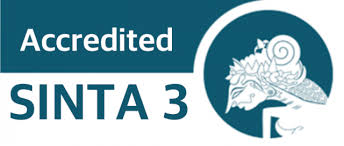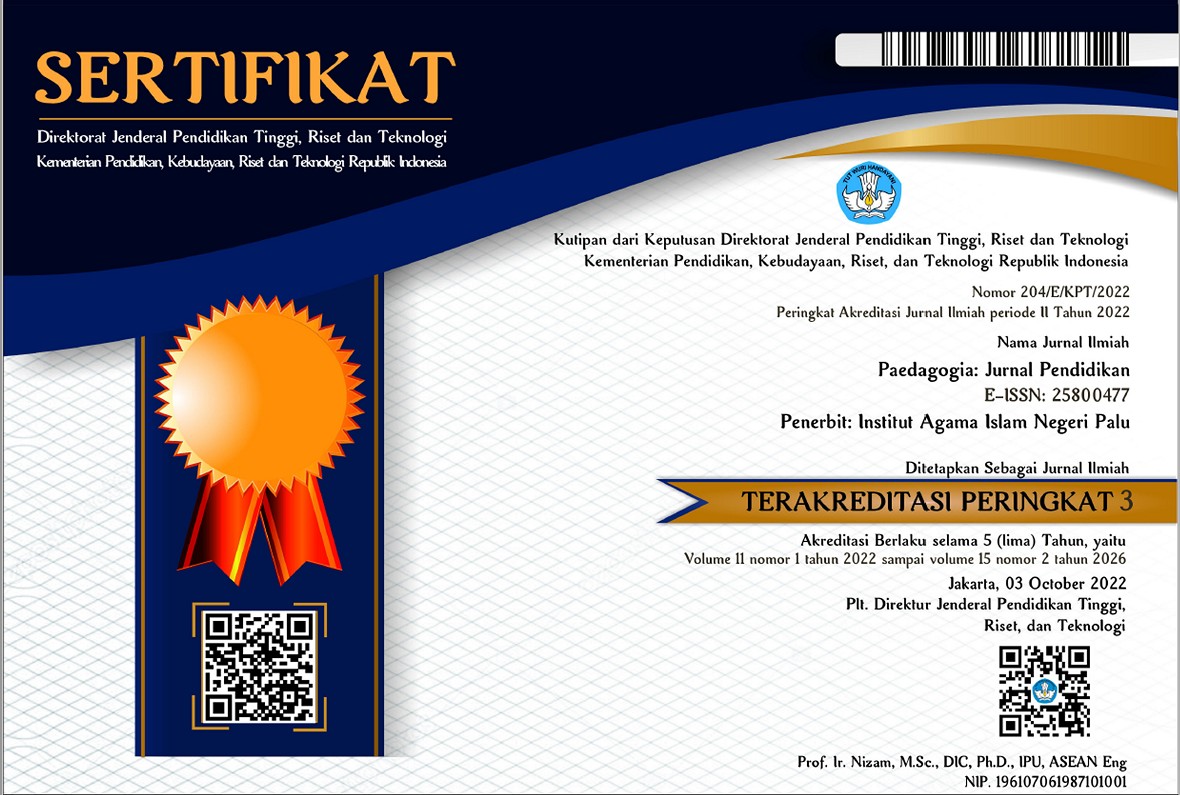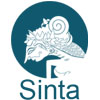How Far a School Program Build Students’ Character? A CIPP Model Evaluation
Abstract
The overarching objective of this research is to investigate a private boarding school’s character education program. Stufflebeam’s CIPP evaluation model served as the basis for the research, which covered the study’s context, input, process, and product. After administering a questionnaire to 35 second-year students, we compiled the necessary data through in-depth interviews with the principal and three teachers. The questionnaire was explored quantitively using regression analysis with a statistical application called SPSS statistics-25. Meanwhile, thematic analysis was utilized to analyze the qualitative data throughout condensation, and regression analysis from SPSS result to be used to conduct a quantitative investigation of the questionnaire. The qualitative data was analyzed using theme analysis throughout the condensation process, beginning with description, progressing through reduction, categorization, and interpretation of data. The results showed that the school positively affected students’ character development through the combination of academic and extracurricular programming. Similarly, pupils felt like they were making headway. Having full support from the institution, even from alums, is a massive plus for character-building programs. In return, the school gains the same merit, boosting the favorable profile of students so that the communities may recognize the school’s characteristics. A reciprocal advantage in developing students’ character is available between the school and the pupils.
Downloads
References
Abdelrahman, Rasha M. “Metacognitive Awareness and Academic Motivation and Their Impact on Academic Achievement of Ajman University Students.” Heliyon 6, no. 9 (2020): e04192. https://doi.org/10.1016/j.heliyon.2020.e04192.
Afridel, Afridel DN. “Principal Management Sekolah Umum Berbasis Pesantren (SUBP) in Strengthening Character Education of Students.” WARAQAT : Jurnal Ilmu-Ilmu Keislaman 7, no. 1 (2022): 19–29. https://doi.org/10.51590/waraqat.v7i1.211.
Akimas, Handreas Sudarmiko, Yusak Tanasyah, Sekolah Tinggi, Teologi Indonesia, Sekolah Tinggi, and Teologi Moriah. “Volume 7 | Nomor 1 | Maret 2022 Pengembangan Pendidikan Karakter Berdasarkan Teori Thomas Licona Di Bimbingan Belajar Barengkok Desa” 7 (2022): 12–21.
Amilda. “Student Management Model through Character Building: An Effort to Improve the Quality of Education in Vocational High School.” JMKSP (Jurnal Manajemen, Kepemimpinan, Dan Supervisi Pendidikan) 8, no. 2 (July 6, 2023): 805–19. https://doi.org/10.31851/jmksp.v8i2.11708.
Aningsih, M. S. Zulela, Amos Neolaka, Vina Iasha, and Bramianto Setiawan. “How Is the Education Character Implemented? The Case Study in Indonesian Elementary School.” Journal of Educational and Social Research 12, no. 1 (2022): 371–80. https://doi.org/10.36941/jesr-2022-0029.
Appova, Aina, and Fran Arbaugh. “Teachers’ Motivation to Learn: Implications for Supporting Professional Growth.” Professional Development in Education 44, no. 1 (2018): 5–21. https://doi.org/10.1080/19415257.2017.1280524.
Aziz, Shamsa, Munazza Mahmood, and Zahra Rehman. “Implementation of CIPP Model for Quality Evaluation at School Level: A Case Study.” Journal of Education and Educational Development 5, no. 1 (May 30, 2018): 189. https://doi.org/10.22555/joeed.v5i1.1553.
Baltaru, Roxana Diana. “Do Non-Academic Professionals Enhance Universities’ Performance? Reputation vs. Organisation.” Studies in Higher Education 44, no. 7 (2019): 1183–96. https://doi.org/10.1080/03075079.2017.1421156.
Cohen, Louis, Lawrence Manion, and Keith Morrison. Research Methods in Education. New York: Routledge, 2007.
Dang, Huu Phuc, and Bang Nguyen Viet. “Inside the Intention to Join Extracurricular Activities: Integrating the Theory of Planned Behavior and Signaling Theory.” Cogent Education 8, no. 1 (2021). https://doi.org/10.1080/2331186X.2021.1888672.
Habe, Hazairin, and Ahiruddin Ahiruddin. “Sistem Pendidikan Nasional.” Ekombis Sains: Jurnal Ekonomi, Keuangan Dan Bisnis 2, no. 1 (2017): 39–45. https://doi.org/10.24967/ekombis.v2i1.48.
Hakan, Karatas, and Fer Seval. “CIPP Evaluation Model Scale : Development , Reliability and Validity.” Procedia - Social and Behavioral Sciences 15 (2011): 592–99. https://doi.org/10.1016/j.sbspro.2011.03.146.
Haryati, Mila Septian. “Menumbuhkan Nasionalisme Pada Siswa Melalui Kegiatan Ekstrakurikuler Pasukan Pengibar Bendera (Studi Kasus Di MAN 2 Model Mataram).” Jurnal Pendidikan Sosial Keberagaman 5, no. 2 (2018): 163–76. https://doi.org/10.29303/juridiksiam.v5i2.67.
Hopkinson, Patrick J. “Book Reviews: Qualitative Data Analysis. An Expanded Sourcebook.” International Journal of Social Psychiatry, 1997. https://doi.org/10.1177/002076409704300109.
Huang, Xianhan, Lin Chin-Hsi, Sun Mingyao, and Xu Peng. “What Drives Teaching for Creativity? Dynamic Componential Modelling of the School Environment, Teacher Enthusiasm, and Metacognition.” Teaching and Teacher Education 107 (2021): 103491. https://doi.org/10.1016/j.tate.2021.103491.
Irene, Elmer A. “Evaluation of Teacher Education Curricula and Its Relevance to Licensure Examination Using Context, Input, Process and Product (CIPP) Model.” Social Sciences and Humanities Open 8, no. 1 (2023): 100607. https://doi.org/10.1016/j.ssaho.2023.100607.
John Doe, Jane Smith. “Intelligence Quotient (IQ), Emotional Quotient (EQ), and Spiritual Quotient (SQ): A Comprehensive Review.” Journal of Intelligence and Emotional Development 12, no. 2 (2019): 145–62.
Julia, and Tedi Supriyadi. “The Implementation of Character Education at Senior High School.” SHS Web of Conferences 42 (2018): 00085. https://doi.org/10.1051/shsconf/20184200085.
Kaawoan, Selviyanti. “Understanding the Concept of Islamic Education for Millennial in Indonesia” 5, no. July (2021): 1426–38.
Kamarullah, Kamarullah, and Barep Sarinauli. “Saya Keras Demi Kepentingan Peserta Didik! Refleksi Pendidik Terhadap Prinsip Mengajar Dan Profesinya.” Ta’dib 13, no. 1 (2023): 1–9. https://doi.org/10.54604/tdb.v13i1.238.
Karaoglan-Yilmaz, Fatma Gizem, Ahmet Berk Ustun, Ke Zhang, and Ramazan Yilmaz. “Metacognitive Awareness, Reflective Thinking, Problem Solving, and Community of Inquiry As Predictors of Academic Self-Efficacy in Blended Learning: A Correlational Study.” Turkish Online Journal of Distance Education 24, no. 1 (2023): 20–36. https://doi.org/10.17718/tojde.989874.
Lewis, Sarah. Qualitative Inquiry and Research Design: Choosing Among Five Approaches. Health Promotion Practice. Vol. 16. SAGE Publications, 2015. https://doi.org/10.1177/1524839915580941.
Lickona, Thomas. “Character Education: Seven Crucial Issues.” Action in Teacher Education 20, no. 4 (1999): 77–84. https://doi.org/10.1080/01626620.1999.10462937.
———. “Eleven Principles of Effective Character Education.” Journal of Moral Education 25, no. 1 (1996): 93–100. https://doi.org/10.1080/0305724960250110.
Manan, Abdul, Muhammad Arif Fadhilah, Kamarullah, and Habiburrahim. “Evaluating Paper-Based Toefl Preparation Program Using the Context, Input, Process, and Product (Cipp) Model.” Studies in English Language and Education 7, no. 2 (September 3, 2020): 457–71. https://doi.org/10.24815/siele.v7i2.16467.
Mansir, Firman. “Aktualisasi Pendidikan Agama Dan Sains Dalam Character Building Peserta Didik Di Sekolah Dan Madrasah.” J-PAI: Jurnal Pendidikan Agama Islam 7, no. 2 (2021): 87–93. https://doi.org/10.18860/jpai.v7i2.11704.
Mashuri. ““Penanaman Karakter Peserta Didik Melalui Peran Pendahuluan Bangsa Indonesia.” Jurnal Cendekia : Jurnal Kajian Teori Dan Praktik Kependidikan 11, no. 3 (2021): 495–509.
Maulya, Ranti, and Kamarullah Kamarullah. “Reading Comprehension of Analytical and Hortatory Exposition : A Comparative Study.” EDUJ: English Education Journal 1, no. 1 (2023): 8–14. https://doi.org/10.59966/eduj.v1i1.467.
Mcgrath, Robert E, Hyemin Han, Mitch Brown, and Peter Meindl. “What Does Character Education Mean to Character Education Experts ? A Prototype Analysis of Expert Opinions Experts ? A Prototype Analysis of Expert Opinions.” Journal of Moral Education 00, no. 00 (2021): 1–19. https://doi.org/10.1080/03057240.2020.1862073.
Miles, Matthew B., A. Michael Huberman, and Johnny Saldana. Qualitative Data Analysis: A Methods Sourcebook. 3rd ed. London: SAGE, 2018.
Muchsin, Misri A., Abdul Manan, Siti Habsari Pratiwi, Cut Intan Salasiyah, and Kamarullah Kamarullah. “An Overview of Inclusive Education in Eastern Aceh, Indonesia: What Do the Educational Elements Say?” Jurnal Ilmiah Peuradeun 10, no. 2 (May 30, 2022): 297. https://doi.org/10.26811/peuradeun.v10i2.631.
Muhtar, Tatang, Tedi Supriyadi, Anggi Setia Lengkana, and Siti Hanifah. “Religious Characters-Based Physical Education Learning in Elementary School.” International Journal of Learning, Teaching and Educational Research 18, no. 12 (December 30, 2019): 211–39. https://doi.org/10.26803/ijlter.18.12.13.
Najafabadi, Amir Jahanian, Hadis Imani, Reza Beygi, António Mendes Lopes, and Lucas Filipe Martins da Silva. “Intelligence, Beliefs on IQ and Learning Style Predict Academic Performance in Mechanical Engineering Students.” U.Porto Journal of Engineering 8, no. 1 Special Issue (2022): 59–72. https://doi.org/10.24840/2183-6493_008.001_0007.
Park, Wonyong, and Hohee Cho. “The Interaction of History and STEM Learning Goals in Teacher-Developed Curriculum Materials: Opportunities and Challenges for STEAM Education.” Asia Pacific Education Review 23, no. 3 (2022): 457–74. https://doi.org/10.1007/s12564-022-09741-0.
Presiden Republik Indonesia. Peraturan Presiden Republik Indonesia tentang Penguatan Pendidikan Karakter (2017).
Rahman, A., I. Wasliman, Hanafiah Hanafiah, and Y. Iriantara. “The Implementation of Strengthening Character Education Program through Scouts Extracurricular Activities in Islamic Senior High School.” Journal of Education Research and Evaluation 5, no. 4 (2021): 633. https://doi.org/10.23887/jere.v5i4.32858.
Rejeki, Sri, and Bernadus Ikir Wilhem. “Penanaman Karakter Moralitas Dan Disiplin Melalui Program Ekstrakurikuler Dan Ko-Kurikuler Di SMA Negeri 2 Donggo.” CIVICUS : Pendidikan-Penelitian-Pengabdian Pendidikan Pancasila Dan Kewarganegaraan 9, no. 1 (2021): 76. https://doi.org/10.31764/civicus.v9i1.5987.
Rombout, F., J. A. Schuitema, and M. L.L. Volman. “Teaching Strategies for Value-Loaded Critical Thinking in Philosophy Classroom Dialogues.” Thinking Skills and Creativity 43, no. November 2021 (2022): 100991. https://doi.org/10.1016/j.tsc.2021.100991.
Sağır, Mahmut, Süleyman Göksoy, and Orhan Ercan. “Views of School Administrators Regarding Accreditation Implementations in Educational Inspection.” Procedia - Social and Behavioral Sciences 116 (2014): 1604–9. https://doi.org/10.1016/j.sbspro.2014.01.442.
Siti Nur Annisa, and Asnil Aidah Ritonga. “The Influence of Teacher Characters on Students’ Learning Interest at Budi Mulia Tanjung Mulia Hilir Junior High School Padang.” Paedagogia: Jurnal Pendidikan 12, no. 2 (September 27, 2023): 283–96. https://doi.org/10.24239/pdg.Vol12.Iss2.454.
Small, Gary W., Jooyeon Lee, Aaron Kaufman, Jason Jalil, Prabha Siddarth, Himaja Gaddipati, Teena D. Moody, and Susan Y. Bookheimer. “Brain Health Consequences of Digital Technology Use.” Dialogues in Clinical Neuroscience 22, no. 2 (2020): 179–87. https://doi.org/10.31887/DCNS.2020.22.2/gsmall.
Stufflebeam, Daniel L. “The CIPP Model for Evaluation.” In Evaluation Models: Viewpoints on Educational and Human Services Education, edited by Daniel L. Stufflebeam, George F.
Madaus, and Thomas Kellaghan, 279–317. Berlin: Springer, 2000. https://doi.org/https:/doi.org/10.1007/0-306-47559-6_16.
———. “The Cipp Model for Program Evaluation.” Evaluation Models, 1983, 117–41. https://doi.org/10.1007/978-94-009-6675-8_7.
Stufflebeam, Daniel L. “Cipp Evaluation Model Checklist,” 2007.
Sugiarti, Rini, Erwin Erlangga, Fendy Suhariadi, Mulya Virgonita I. Winta, and Agung S. Pribadi. “The Influence of Parenting on Building Character in Adolescents.” Heliyon 8, no. 5 (2022). https://doi.org/10.1016/j.heliyon.2022.e09349.
Uğur, Akpur, Alcı B uuml lent, and Karataş Hakan. “Evaluation of the Curriculum of English Preparatory Classes at Yildiz Technical University Using CIPP Model.” Educational Research and Reviews 11, no. 7 (2016): 466–73. https://doi.org/10.5897/err2016.2638.
Ulfiandi, Ihsan Zikri. “Manajemen Boarding School Dalam Peningkatan Prestasi Dan Karakter Religius Siswa Ma’had Alqolam MAN 2 Kota Malang.” Ulul Amri: Jurnal Manajemen Pendidikan Islam 1, no. 2 (June 27, 2022): 157–72. https://doi.org/10.18860/uajmpi.v1i2.1381.
Wati, Lisman, Nurdin H Rahman S, and Murjoli Rodja. “The The Role of Teachers in the Character Building of Students at Karitas Watuneso High School.” Economics and Education Journal (Ecoducation) 2, no. 2 (September 24, 2020): 112–19. https://doi.org/10.33503/ecoducation.v2i2.844.
White, Mathew A. “An Australian Co-Educational Boarding School: A Sociological Study of Anglo-Australian and Overseas Students’ Attitudes from Their Own Memoirs.” International Education Journal 5, no. 1 (2004): 65–78.
Yenny Nur Andini, and Afakhrul Masub Bahtiar. “The Role of the Teacher in Developing Students’ Character at MI Muhammadiyah 2 Karangrejo Gresik.” Paedagogia: Jurnal Pendidikan 12, no. 2 (September 27, 2023): 297–308. https://doi.org/10.24239/pdg.Vol12.Iss2.447.
Yilmaz, Rabia Meryem, Fatma Burcu Topu, and Ayşegül Takkaç Tulgar. “An Examination of the Studies on Foreign Language Teaching in Pre-School Education: A Bibliometric Mapping Analysis.” Computer Assisted Language Learning 35, no. 3 (March 4, 2022): 270–93. https://doi.org/10.1080/09588221.2019.1681465.
Zhang, Guili, Nancy Zeller, Robin Griffith, Debbie Metcalf, Jennifer Williams, Christine Shea, and Katherine Misulis. “Using the Context, Input, Process, and Product Evaluation Model (CIPP) as a Comprehensive Framework to Guide the Planning, Implementation, and Assessment of Service-Learning Programs.” Journal of Higher Education Outreach and Engagement 15, no. 4 (2011): 57–84.
Zurqoni, Heri Retnawati, Janu Arlinwibowo, and Ezi Apino. “Strategy and Implementation of Character Education in Senior High Schools and Vocational High Schools.” Journal of Social Studies Education Research 9, no. 3 (2018): 370–97. https://doi.org/10.17499/jsser.01008.
Copyright (c) 2024 Paedagogia: Jurnal Pendidikan

This work is licensed under a Creative Commons Attribution-NonCommercial 4.0 International License.
The author agrees to the following conditions upon publishing a work to Paedagogia: Jurnal Pendidikan:
1. Each article is licensed under a Creative Commons Attribution-NonCommercial 4.0 International License. The author(s) recognizes that Paedagogia: Jurnal Pendidikan has the right to be the first to publish under a Creative Commons Attribution-NonCommercial 4.0 International License. This license permits the copying and redistribution of this material in any form or format, as well as the composition, modification, and creation of derivative works of this material for any purpose, but Non commercial, as long as the author is credited with the original work.
2. Authors may submit articles separately or arrange for non-exclusive distribution of manuscripts previously published in this journal in other forms (e.g., to the author's institutional repository, publication in books, etc. ), provided that the manuscript is acknowledged as having been published first in the Paedagogia: Jurnal Pendidikan.
3. A copyright submission agreement must attach each approved manuscript prior to publication. You may obtain the form for the copyright submission agreement here (INA) (EN).












































 This work is licensed under a
This work is licensed under a 